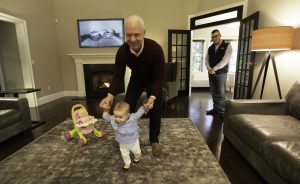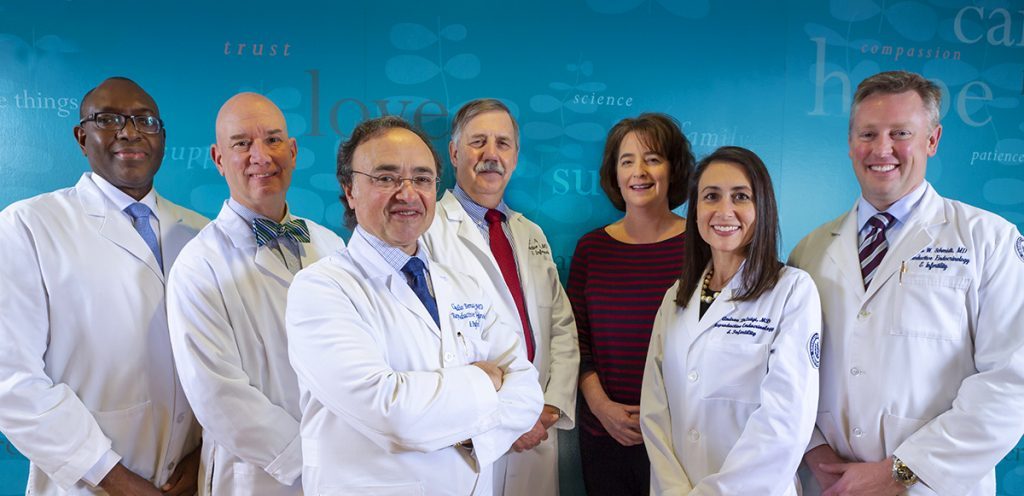LGBTQ parents-to-be can face unique challenges
By Cara McDonough / Photography by Tony Bacewicz
The decision to start a family often comes from the heart.
But for many, the path to having children isn’t an easy one, requiring unanticipated medical procedures, time and, sometimes, a significant financial investment.
In the LGBTQ community, the issue often presents even more hurdles; simply getting access to information about available options can be difficult. Plus, once a child is born, there may extra steps necessary to ensure both parties in a couple have the same parental rights.
That’s where fertility clinics that specialize in working with the LGBTQ community can help, providing the latest technology and a wealth of resources, while advocating for the rights of their patients.
“Depending on the situation, there are lots of physical and biological challenges. We need both eggs and sperm to create embryos. There may need to be a gestational carrier,” says Paul Verrastro, chief executive officer of the Center for Advanced Reproductive Services in Farmington. “All of those things are manageable today but one challenge is information. A lot of the time, people don’t have access to all the facts.”
The center works to bridge that gap to access. As one of the largest and most successful in vitro fertilization (IVF) programs in the state and nation, it has deep ties to the LGBTQ community that “go way back,” says Verrastro.
The group has helped roughly 1,600 LGBTQ individuals or couples achieve successful births over nearly 40 years. Initially, patients were mostly lesbians or lesbian couples, Verrastro says, but now the center serves a much broader swath of the population, including single gay men, gay couples, and transgender individuals.
“We are very proud of the fact that we were really at the forefront of this in the early 1980s, and that we’ve continued to serve the community as their needs and the technology has evolved,” Verrastro says. The center’s mission includes ensuring people across the state get the up-to-date information they need, like when it hosted an LGBTQ Family Building Symposium with the New Haven Pride Center this summer.
He is also proud that the organization employs a number of individuals in the LGBTQ community, starting at the top.
“I think the fact that in 1999 the organization was willing to hire an openly gay [chief operating officer] probably had to do with the fact that they’ve been serving the community for so long,” he says, referencing the beginning of his own career at the center.
Verrastro, whose background is in business, says having a job where he can use his expertise to “literally change people’s lives like this” has been rewarding.
“I feel incredibly blessed and fortunate to be part of an organization whose mission it is to help create families – gay straight, single, it doesn’t matter,” he says. “Information is power and if people understand the options, they can make choices.”
Southington residents James and Jason G. learned this firsthand when they became patients at The Center for Advanced Reproductive Services, eventually having a daughter through an egg donor and gestational carrier in 2018.
“We both never thought that getting married was something that would have been possible and certainly never gave having a child a second thought,” James says of the hurdles they initially faced.
But after a meeting at the center, and realizing the myriad options available to them, they took the plunge.
“I’m a natural born caregiver, and my husband saw that in me. He saw the love and joy that I would have and get from caring for our nieces and nephews – and wanted to make that dream come true for us,” James says.

Today, their daughter is 14 months old; Jason says that they “could not be more in love” – and are back at the center to try for a sibling.
For prospective parents looking to go this same route, getting all the information they need means understanding that, socially and legally, there are still challenges facing the LGBTQ community when it comes to family planning. Depending on an LGBTQ couple’s specific journey to parenthood, the parent not biologically related to a child may have to go through an official adoption process to have equal rights.
The law of the land is that gay people can get married, Verrastro says, “but other laws have not caught up.” He’s hopeful that process will become easier in coming years. A bill called the Connecticut Parentage Act, sponsored by Rep. Jason Rojas (D-East Hartford), would help clarify current laws for these couples. The bill is based on the 1973 Uniform Parentage Act, which was revised and passed in several states in 2017.
Despite some hurdles, Verrastro says, starting a family is within reach for most people who want one.
“There honestly aren’t any challenges right now where there is not a doable workaround,” he says. “There is no reason why anyone who wants to have a genetic child should not do it, because we can get everyone where they want to be, both clinically and legally.”
With adequate access to information, advocacy and the latest medical innovation, the possibilities are endless, agrees Dr. Mark Leondires. He is founder, medical director and a partner in reproductive endocrinology at Reproductive Medicine Associates of Connecticut (RMACT), which has offices in Trumbull, Stamford, Norwalk and Danbury, as well as Poughkeepsie, NY. In August the practice announced it is the only freestanding fertility clinic in New England to earn the “LGBTQ Healthcare Equality Leader” designation in the Human Rights Campaign’s Foundation Healthcare Equality Index.
Leondires also is medical director at Gay Parents To Be, an organization founded in 2012 as a resource for the LGBTQ community, providing resources for everything from medical options to legal counsel. The group’s website provides comprehensive information on egg donation, IVF, surrogacy and more, including success rates, as well as links to upcoming events and seminars on the topic.
“If you’re in the LGBTQ community, you’re going to need a donor. You need education, you need to think about how you’re going to talk to your kids in the future and to think about the mental health part of it,” he says. “Many families will need a good lawyer so that they can understand their rights.”
The process can be challenging, he adds, “but it’s definitely getting better.”
Leondires takes his work and personal passion out into the world on a regular basis, speaking locally and nationally to groups, including companies, about LGBTQ employees and their health insurance benefits – or lack thereof.
“One of the things that many people don’t realize is that to have access to fertility benefits, you have to be ‘infertile,’ ” he says, noting that for gay, lesbian and transgender individuals and couples, this designation might not technically apply when looking to insurance for fertility treatment.
He wants Connecticut fertility law to change to better serve the population. And he wants everybody to know the basics of planning, so they can take steps sooner rather than later. He is quick to remind those thinking of transitioning, for instance, that they can freeze eggs or sperm and it leaves the doors wide open for future family planning. He also encourages women approaching age 35 to have their fertility assessed.
But until laws change for the better, he’ll be encouraging employers to do what’s right.
“I proudly push the boulder up the hill to try and be treated fairly,” he says, adding that in his talks, he explains that the LGBTQ community doesn’t want anything different; they just want the same benefits as everybody else.
And when it comes to selecting the right provider, he notes not all practices are truly friendly to the community. He’s proud to be part of one that is. Small details matter, he says. A few years back, his clinic went through every single piece of paper they produced, ensuring copy included the words “patient” and “partner” on it, rather than gender-specific words.
“Those things really make a difference,” Leondires says. It’s a difference the families that work with him and his team can clearly feel.
“We felt welcome from day one at RMACT with Dr. Leondires, but also felt comfortable on day one with his staff. His nurses, coordinators and all others are professional, knowledgeable, and encouraging and welcoming for new families, including us as gay parents,” says Adam Eckhart of Melrose, Mass., who has three children with his partner, Prescott, born through treatment at the clinic.
“For many gay couples, I think there’s a certain amount of anxiety that accompanies new situations, such as meeting new doctors. It’s always a question of how and to what extent we’ll be received and made to feel comfortable. With RMACT, those anxieties were immediately put to rest,” says Crissy McCaw of Glen Spey, N.Y., another patient. She and her wife have two living children – 4 and 2 years old. They also lost a baby when their twins were born 17 weeks early. She says the RMACT team treated them “like family” through the happy and hard times.
“From the very beginning, we felt completely welcome and at home, and we never once doubted whether we made the right choice,” she says.
Leondires said that hearing from joyful families after they’ve had their babies are the “punctuations marks to his day.”
“What’s really exciting about it is to help people who thought having children might not be a possibility,” he says. “To help them realize that dream is such an honor and a privilege.”









More Stories
Young, Queer Love: How Different Is It?
A Leader in Care for LGBTQ+ Communities: Meet Kenneth Abriola, MD
Transforming Sexuality: Handling Sexual Changes for Trans Folks